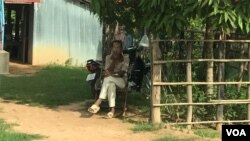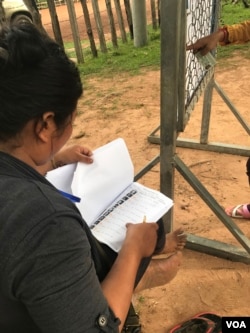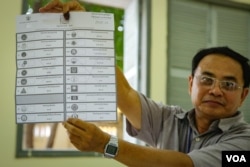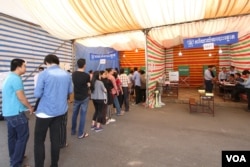Although Prime Minister Hun Sen’s Cambodian People’s Party won a landslide victory in the recent general election, there is growing affirmation that in the weeks leading up to the vote local authorities carried out surveillance of suspected opposition supporters.
In practice, this extended to anyone calling for a boycott of the election, or anyone publicly supporting the banned Cambodia National Rescue Party (CNRP), or the recently formed Cambodia National Rescue Movement (CNRM), which Hun Sen dubbed a “terrorist organization.”
On election day, the surveillance showed no signs of abating, as local officials posing as election monitors stationed themselves outside polling stations to record the names of those who did not turn out to cast a ballot.
In Siem Reap province’s Chi Kreng district, local officials and members of Hun Sen’s ruling Cambodian People’s Party (CPP) had a list of names and they highlighted those who voted. One village administrator said he would pay those who did not turn up a house call. “I will go to call those people who didn’t come to vote when the polling is about to finish,” he said.
At two other nearby polling stations, VOA found local officials carrying out the same task, despite local administration officials being barred from taking part in political activities during the vote.
The CNRP won more than 40 percent of the popular vote in local elections in 2017, but after the party was banned in November of that year, the hundreds of local authorities they controlled were taken over by the CPP, giving Hun Sen’s ruling party control of the day-to-day running of local government affairs.
After much criticism from the international community, the CPP needed a high turnout at the election to prove its legitimacy. As a result, villagers across Cambodia complained of increased threats and intimidation to participate.
However, despite 19 minor political parties contesting the vote, the second largest category of votes cast in the election were for what has been dubbed the Spoiled Ballot Party, with increases in the number of spoiled ballots up by orders of magnitude compared with previous elections.
Pech Bottom, a villager in Kampong Kdey commune, said he had not voted as he was a CNRP supporter even though he felt pressured to vote by the local administration.
“I saw village authorities with lists at the polling station and checking names of people going to vote,” he said. Officials’ threats to withheld public services from those who did not vote had also played a part in the high turnout.
“Some went to vote, but under duress,” he said. “They spoiled the ballot.”
“They told us that if we don’t go to vote, the authority will not make any documents for villagers when they want them, like for weddings or any ceremonies.”
Sarin, 39, a villager in Kampong Chhnang province, said local officials threatened to block the signing of documents if they did not vote.
“The village authority just told villagers to go to vote. They told us that if we don’t go to vote, the authority will not make any documents for villagers when they want them, like for weddings or any ceremonies,” she said.
“Why the village authority do like that? It is a threatening. It is villagers’ rights to go to vote or not vote,” said Sarin who asked VOA Khmer not to use her full name because she was afraid.
“I feel afraid of not going to vote,” she added. “Some villagers and I discussed and they said they would go to vote thought they don’t want to since they don’t want authority to notice them.”
“It is pressure. All villagers are afraid of that,” added Sarin. “As a citizen I don’t want it to be like that. Why is our country like that?”
For decades, the ruling party has worked to blur the boundary between the CPP and the state, funding local development projects using state money which are attributed to the CPP’s largesse. Thousands of schools carry the prime minister’s name. Many were transformed into polling stations on election day. The party, Cambodians are told, “gives life.”
In Botom’s family, only the older generation went to vote. Hun Sen is believed to have a strong following among older Cambodians, who may remember the days of genocide and civil war prior to the signing of peace accords in 1991.
San Sak, 41, the former CNRP councilor in neighboring Kork Thlork Krom commune, says CPP officials had gone door-to-door on election day, calling on people to vote.
“The village chief walked from home to home and asked people to go to vote,” he said. “They [villagers] were scared and tired. It was pressure to go to vote,” he said, adding that authorities were more likely to provide administrative services to people whose fingers were stained with the indelible ink used as an anti-election fraud measure.
Sok Eysan, CPP spokesman, defended the pressure placed on opposition supporters in local authorities here, saying the officials had not used force to get people to the polling stations.
Some 600,000 Cambodians spoiled their ballots during the election, about one in ten of the votes cast. Hun Sen has claimed that the CPP has some 5 million supporters across the country, but won only about 3 million votes in the 2013 election. In response to disappointing results in the 2017 commune elections, the CPP embarked on an ambitious new membership campaign to register entire households as “CPP families” to ensure support in last week’s election.
In a statement on Monday, the CNRP said: “Without the party of their choice, millions of Cambodian voters were left with no choice other than to boycott the election. They live in fear with constant threats and intimidation by the ruling party to coerce them to vote.”
Former CNRP president Sam Rainsy, who has been living in exile since 2015, had called on Cambodians to boycott the election through an online campaign known as the Clean Finger Campaign.
On Friday, the last day of election campaigning, Hun Sen said: “Now the majority of people will go to vote. For those at the local level who don’t go to vote, how will you live with your neighbors?”
“Those who are against voting are the people who destroy the nation and democracy, which must not be forgiven,” he added.












